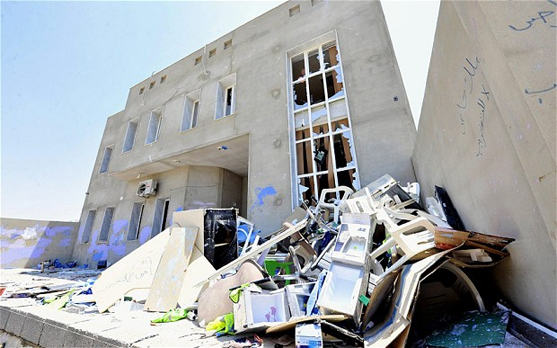
Benghazi, Jul 28: Over 1,000 inmates escaped during a prison riot on Saturday in the restive city of Benghazi, a Libyan security official said, as protesters attacked Muslim Brotherhood offices following a wave of assassinations.
"There was a riot inside Al-Kuifiya prison, as well as an attack from outside. More then 1,000 prisoners escaped. Special forces called in as reinforcements were given orders not to fire at the prisoners," the official said, asking not to be named.
He said most of the escapees were common law detainees, including nationals of other African states.
"But some of them were detainees in cases linked to the former regime of Muammer Gaddafi," he said, adding that several inmates were recaptured shortly after the breakout.
Prime Minister Ali Zeidan confirmed the incident, without giving the number of fugitives.
"Residents of the area carried out the attack because they don't want the prison near their homes," he said, adding that border posts had been alerted and given a list of names to apprehend the escapees.
Zeidan earlier announced that border posts with Egypt had been closed to prevent the escape of the killers of a prominent activist in the eastern Libyan city on Friday.
Thousands of Libyans protested earlier on Saturday in Tripoli and Benghazi against parties including the Muslim Brotherhood blamed for the wave of violence in the east of the country.
Protesters ransacked Tripoli offices of both the Brotherhood's political wing, the Party of Justice and Construction (PJC), and its liberal rival, the Alliance of National Forces (NFA).
In Benghazi, youths stormed and ransacked the building housing the PJC, after hundreds took to the streets on Friday night to condemn the assassination of Abdessalem al-Mesmari, an anti-Islamist lawyer who campaigned for a civil state.
The demonstrators accuse the Brotherhood of being behind killings that have targeted dozens of officers, especially in Benghazi, the city that was the cradle of the 2011 armed uprising that ousted longtime dictator Kadhafi.
In Tripoli, hundreds of people gathered at Martyrs' Square in the heart of the capital to demonstrate in "solidarity with Benghazi" and against the Islamist movement.
Chanting "the blood of martyrs was not shed in vain," the protesters converged on the square as they left mosques after morning prayers, an AFP correspondent reported.
About 100 youths then descended on PJC offices in the Ben Ashur district, smashing its windows and looting furniture.
From the outset, the demonstrators chanted slogans against the Brotherhood, but they later also targeted the NFA which won July 2012 elections.
Around 100 protesters converged on the alliance's offices in Hay al-Andalus neighbourhood, invading the premises and throwing documents out of windows.
"We want all political parties to be dissolved," said one protester, Ahmed Trabelsi.





Comments
Add new comment